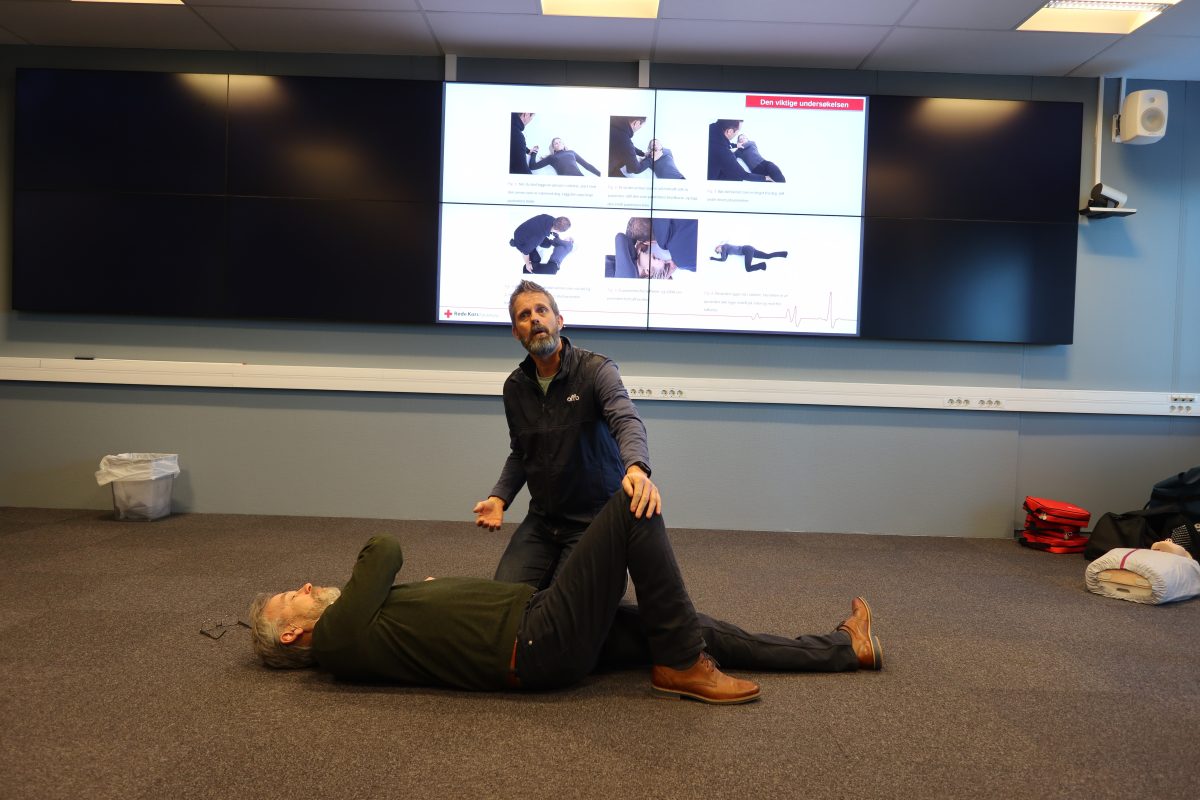2023 was a busy year for OFFB. The number of operations the organisation supports has remained steady and high since 2020. There has also been a high activity level for training and exercises, including at the OFFB Competence Centre.
The largest single activity by far was Exercise Draugen in March 2023. A total of 800 people took part in one of the largest oil spill response exercises in Norway ever, organised by OKEA, NOFO and OFFB with support from OFFB's other members and a number of additional organisations.with support from OFFB's other members and a number of additional organisations.
2023 also offered changes, both among OFFB's members and internally within the organisation. The year started off with 22 people previously hired as coordinators in the 2nd line, becoming part-time employees

“It has been quite demanding to us as an organisation, requiring training and refresher training, but the end result is positive. We observe that people get to know the company differently, and feel a greater sense of belonging when they are employed,” says Ole Jacob Haug.
More new employees
Two of our employees, who had been with OFFB from the beginning, retired in 2023. In addition, a third long-term employee chose to move on to emergency tasks in another organisation.
A lot of experience and history disappeared with them. At the same time, we have brought in new and talented staff members, who build on the work that has been put in earlier, and help us move forward. We also have strengthened our strategic crisis communication team, based on the volume of deliveries and demand among members.
Aker BP a new member
The number of members of OFFB is stable, but continuously developing. In January 2023, , Aker BP joined as a member.Throughout the year, we have gotten to know the organisation well, by planning and carrying out exercises, and through media training provided by OFFB’s strategic crisis communication team (SKT).
“Having a highly competent organisation like Aker BP as a member has been an entirely positive experience. We’ve become familiar with highly skilled people, and had the chance to test out new ways of exercising. We feel that this has been instructive for both parties,” says Haug.
ICS training in practice
Another field we are learning to master is the Incident Command System (ICS). Companies operating on the Norwegian continental shelf entered into a mutual agreement last year, to use ICS during long-term incidents. The agreement states that the operators undertake to provide training and education, and to share trained personnel at incidents that require an ICS organisation.

OFFB has built up an in-house ICS expertise of high quality, and we rig ourselves in order to be able to support our members’ ICS organisations. All permanent employees have undertaken the courses required. In addition, several of our part-time employees participated in last year’s Exercise Draugen, and received exceptionally good practical training. The entire oil recovery operation was handled in accordance with the ICS management system.
“Exercise Draugen provided valuable learning about a long-term incident, and how to handle such incidents in the future,” says Haug.
Together with Aker BP, OFFB now contributes to the planning of the next major exercise. This will be another opportunity for our members to practice ICS.
Looking towards new industries
Like everyone else in the energy industry, OFFB follows the green transition with great interest. We have set up a special project group which, among other things, closely follows the work on preparing regulations for emergency preparedness within the offshore wind industry.
“We are pleased to be asked to contribute to emergency preparedness and response for new industries in the planning. We possess a broad expertise and a long experience in putting preparedness at the top of the agenda, and we see that this can be transferred from the oil and gas industry to new industries. We clearly believe that OFFB has a role to play here,” says Haug, and adds:
“We have a positive view of the future. The Petroleum Safety Authority changing its name to Norwegian Ocean Industry Authority, and the Norwegian Petroleum Directorate to the Norwegian Offshore Directorate is a sign of the times, and we at OFFB are observing these changes with interest. New industries are coming in that need emergency response services, and we are prepared to deliver on that,” says Haug.

In the past year, we have also tried out several new technologies, including artificial intelligence (AI), to improve the efficiency of our training and exercise activities. CIM - the crisis management system used by our members - will have a tailor-made ICS module added to it.
Memberships increasing - but there is room for more
In recent years, we have seen more acquisitions and mergers taking place among companies operating on the NCS. Several of our members have become bigger and stronger. 2023 was no exception. Neptune Energy was acquired by the Norwegian operator Vår Energi, and the news about Wintershall Dea's Norwegian arm being acquired by the British company Harbour Energy came at the very end of the year.
“This implies both opportunities and challenges, but we at OFFB keep up and deliver what our members need to maintain a robust emergency preparedness and response system. During 2024, our membership base will actually increase, as new companies are coming in,” says Haug, and emphasises that OFFB has room for more members - both small and large.
The most essential feature is having a volume of members high enough to provide learning, and a composition of members that provides variety.
“It is important to us that we get to exercise and learn together with as many people as possible, and that we have incidents that we can learn from. We see that we have an important role to play in contributing to emergency preparedness. We also see that OFFB has helped set a standard for emergency preparedness and response, and we will continue with that in 2024, says Ole Jacob Haug.
About OFFB:
The Operator’s Association for Emergency Response, known as OFFB, is a member-led emergency response organisation run by NCS operators A/S Norske Shell, DNO, Gassco, Neptune Energy Norge, OKEA, Sval Energi, Wellesley Petroleum, Wintershall Dea og Aker BP.
Since its beginning in 2009, OFFB has provided professional 2nd line emergency response services and support to our member companies’ strategic emergency response management, and forms an integral part of their emergency response systems. OFFB also acts as a resource and expertise centre to all its members.















